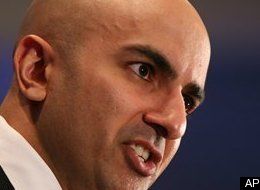No one could have seen this coming. Giving 700 billion dollars with no strings to the Bush administration was such a good idea:
The financial world was fixated on Capitol Hill as Congress battled over the Bush administration's request for a $700 billion bailout of the banking industry. In the midst of this late-September drama, the Treasury Department issued a five-sentence notice that attracted almost no public attention.And then there's this:
But corporate tax lawyers quickly realized the enormous implications of the document: Administration officials had just given American banks a windfall of as much as $140 billion.
The sweeping change to two decades of tax policy escaped the notice of lawmakers for several days, as they remained consumed with the controversial bailout bill. When they found out, some legislators were furious. Some congressional staff members have privately concluded that the notice was illegal. But they have worried that saying so publicly could unravel several recent bank mergers made possible by the change and send the economy into an even deeper tailspin.
"Did the Treasury Department have the authority to do this? I think almost every tax expert would agree that the answer is no," said George K. Yin, the former chief of staff of the Joint Committee on Taxation, the nonpartisan congressional authority on taxes. "They basically repealed a 22-year-old law that Congress passed as a backdoor way of providing aid to banks."
The nation may be diving headlong into recession, but that's not stopping financial firms from a cherished year-end tradition: the awarding of bonuses.Awesome. Well at least we've got that transparency we were promised:
The number of bankers who will share the bonus pool has also decreased because of layoffs, the report found.
The top executives will likely get paid "primarily in paper," meaning stocks and stock options, according to Alan Johnson of Johnson and Associates. Pay will be down, he said, but there will still be "thousands of people who make millions of dollars."
In the report, he said, however, that "thanks in part to the financial bailouts and mergers we've seen recently, the decline in incentive payments won't be as drastic as first thought."
 [Neel Kashkari, the former(by several weeks) Goldman Sachs Executive in charge of giving away your money]
[Neel Kashkari, the former(by several weeks) Goldman Sachs Executive in charge of giving away your money]To see Neel Kashkari field questions from a crowded room, one might think he's still being paid by Goldman Sachs rather than American taxpayers.
The interim assistant secretary of the Treasury for financial stabilization yesterday had a tone of impatience during a question-and-answer session, leaving some attendees feeling cheated.. . .When it came time for questions, the former Goldman Sachs executive told the eager audience that he had time for just "two or three."
In response to the first question, about the government's latest lifeline for beleaguered insurance company American International Group, Kashkari gave a clipped response before quickly moving on.
"This morning's action at AIG was a one-off event" that was necessary for the financial stability of the markets, he said. "He didn't say anything that I couldn't have learned from going to the Web site," griped one mortgage entrepreneur. Treasury spokeswoman Jennifer Zuccarelli said it's not unusual for public officials to answer a few questions before moving on. Kashkari's impatient tone comes amid a growing desire for openness about how government agencies, including the Treasury, are handling billions of taxpayer dollars being used to prop up Wall Street.
Yesterday's news that the Treasury and Federal Reserve increased the size of American International Group's rescue to around $150 billion from $123 billion intensified concern that Uncle Sam isn't spending wisely.
Meanwhile, Bloomberg News sued the Federal Reserve for information under the US Freedom of Information Act, claiming the Fed refuses to identify the recipients of almost $2 trillion of emergency loans as well as the troubled assets the bank is accepting as collateral.
The more news that comes out about this thing, the worse it seems. It's important to remember that the those who strongly advocated passing this bailout weren't innocent bystanders caught up in a whirlwind, they knew what they were doing.
They were giving 700 billion dollars to the Bush Administration's Treasury Secretary without any meaningful strings attached. And it's not like you needed news stories like these to know that it probably wasn't going to end well.


No comments:
Post a Comment